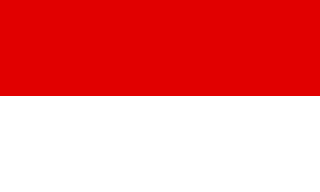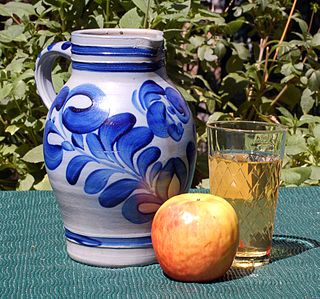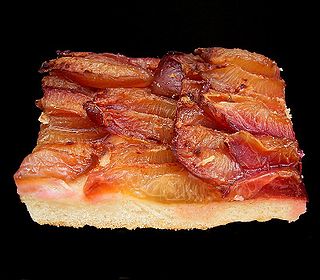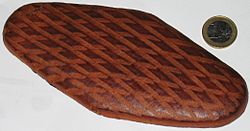
Hesse, officially the State of Hesse, is a state in Germany. Its capital city is Wiesbaden, and the largest urban area is Frankfurt, which is also the country's principal financial centre. Two other major historic cities are Darmstadt and Kassel. With an area of 21,114.73 square kilometers and a population of over six million, it ranks seventh and fifth, respectively, among the sixteen German states. Frankfurt Rhine-Main, Germany's second-largest metropolitan area, is mainly located in Hesse.

Darmstadt is a city in the state of Hesse in Germany, located in the southern part of the Rhine-Main-Area. Darmstadt has around 160,000 inhabitants, making it the fourth largest city in the state of Hesse after Frankfurt am Main, Wiesbaden, and Kassel.

A spritzer is a tall, chilled drink, usually made with white wine and carbonated water or sparkling mineral water. Fermented simple syrup can be used instead of white wine to keep it sweet but flavor neutral.

The Landgraviate of Hesse-Kassel, spelled Hesse-Cassel during its entire existence, was a state of the Holy Roman Empire. The state was created in 1567 when the Landgraviate of Hesse was divided upon the death of Philip I, Landgrave of Hesse. His eldest son William IV inherited the northern half of the Landgraviate and the capital of Kassel. The other sons received the Landgraviates of Hesse-Marburg, Hesse-Rheinfels and Hesse-Darmstadt.

Apfelwein, or Viez or Most are German words for cider. It is made from a mix of sour tasting apples, such as "Bohnapfel" or "Speierling", respectively. It has an alcohol content of 4.8–7.0% and a tart, sour taste.

Louis, Prince of Hesse and by Rhine was the youngest son of Ernest Louis, Grand Duke of Hesse by his second wife, Princess Eleonore of Solms-Hohensolms-Lich. He was a great-grandson of Queen Victoria.

The People's State of Hesse was one of the constituent states of Germany from 1918 to 1945, as the successor to the Grand Duchy of Hesse after the defeat of the German Empire in World War I, on the territory of the current German states of Hesse and the Rhineland-Palatinate. The State was established after Grand Duke Ernest Louis was deposed on 9 November 1918. The term "People's State" referred to the fact that the new state was a Republic and was used in the same manner as the term Free State, which was employed by most of the other German States in this period.

The Grand Duchy of Hesse and by Rhine was a grand duchy in western Germany that existed from 1806 to 1918. The Grand Duchy originally formed from the Landgraviate of Hesse-Darmstadt in 1806 as the Grand Duchy of Hesse. It assumed the name Hesse und bei Rhein in 1816 to distinguish itself from the Electorate of Hesse, which had formed from neighbouring Hesse-Kassel. Colloquially, the grand duchy continued to be known by its former name of Hesse-Darmstadt.

Greater Hesse was the provisional name given for a section of German territory created by the United States military administration in at the end of World War II. It was formed by the Allied Control Council on 19 September 1945 and became the modern German state of Hesse on 1 December 1946.

The Hessen State Police numbers approximately 15,500 police officers and 2,500 civilian employees.

The Hessenliga is the highest football league in the state of Hesse and the Hessian football league system. It is one of fourteen Oberligas in German football, the fifth tier of the German football league system. Until the introduction of the 3. Liga in 2008 it was the fourth tier of the league system, until the introduction of the Regionalligas in 1994 the third tier.

Tarek Mohammed Al-Wazir is a German politician. Al-Wazir is a member of Alliance '90/The Greens, and since January 2014, he has been deputy to the Hessian Minister-President, and Hessian Minister of Economics, Energy, Transport and Regional Development. He is a member of the Landtag of Hesse and was co-chair of the Hessian Green Party.

The civil flag of Hesse, Germany consists of a bicolor of a red top and a bottom white stripe, in the proportion 3:5. The state flag is similar, except it is emblazoned with the state coat of arms in the centre, and may only be used by government departments and services.

Volker Bouffier is a German politician of the Christian Democratic Union (CDU) who served as Minister President of the German state of Hessen from 31 August 2010 to 31 May 2022. From 1 November 2014 until 31 October 2015 he was President of the Bundesrat and ex officio deputy to the President of Germany.

Zwetschgenkuchen, Pflaumenkuchen, Zwetschgendatschi or Zwetschgenplootz (Franconia) is a sheet cake or pie made from yeast dough or shortcrust dough that is thinly spread onto a baking sheet or other baking mold and covered with pitted zwetschgen plums. It is popular as a summer cake and has different local labelings throughout Germany, Austria and Switzerland.

Hessian cuisine is based on centuries-old recipes, and forms a major part of the Hesse identity. Reflecting Hesse's central location within Germany, Hessian cuisine fuses north German and south German cuisine, with heavy influence from Bavarian cuisine and Rhenish Hesse. Sour tastes dominate the cuisine, with wines and ciders, sauerkraut and handkäse with onions and vinegar popular.
The Hessian War, in its wider sense sometimes also called the Hessian Wars (Hessenkriege), was a drawn out conflict that took place between 1567 and 1648, sometimes pursued through diplomatic means, sometimes by military force, between branches of the princely House of Hesse, particularly between the Landgraviate of Hesse-Cassel and the Landgraviate of Hesse-Darmstadt. It was triggered by a division of inheritance following the death of the last landgrave of all Hesse, Philip I in 1567.

Janine Natalie Wißler, known professionally as Janine Wissler, is a German politician who has been co-chairwoman of The Left and member of the Bundestag for Hesse since 2021. Prior to that, she served as member of the Landtag of Hesse since 2008 and leader of the state parliamentary group since 2009, including as sole leader since 2014, as well as deputy leader of the federal party since 2014. She was one of The Left's lead candidates for the 2021 German federal election, alongside Dietmar Bartsch.

The Hessian Central State Archives, Wiesbaden is a department of the Hessian State Archives and is located in Wiesbaden, the capital of the German state of Hesse. It serves alongside the Hessian State Archives, Darmstadt and the Hessian State Archives, Marburg as the main regional archives for Hesse and additionally functions as the central archives for the state government and ministries, as well as other institutions with nationwide jurisdiction.

Boris Rhein is a German lawyer and politician of the Christian Democratic Union (CDU) who has been serving as Minister-President of Hesse since 2022. He has been active in the politics of Hesse since the late 1990s. After being elected to the Landtag of Hesse in 1999, he served as the state's Minister for the Interior from 2010 until 2014 and as the Minister for Science and Art from 2014 to 2019. On 31 May 2022, he was elected to succeed Volker Bouffier as the Minister-President of Hesse.















